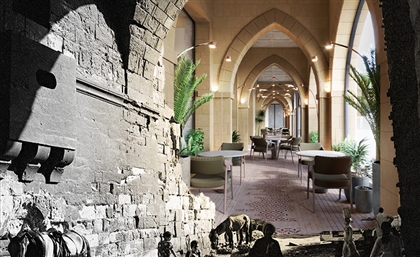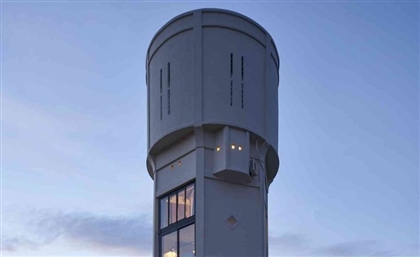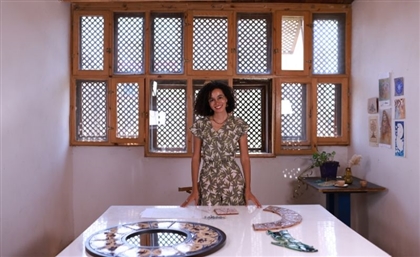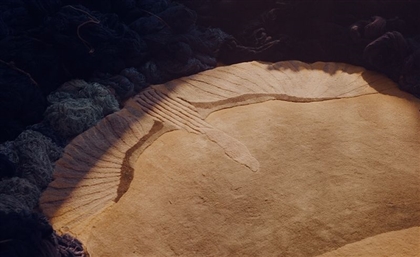Abdelwahed El-Wakil Recieves the Tamayouz Lifetime Achievement Award
At the inaugural Arab Architecture Festival, a master of tradition is recognised for shaping the future of Arab architecture

During the inaugural Arab Architecture Festival in Baghdad, Dr Abdelwahed El-Wakil received the 2025 Tamayouz Lifetime Achievement Award, recognising a career that has shaped architecture across the Arab world.
The award, established in 2012 by Iraqi architect Ahmed Al-Mallak, has grown from recognising architecture graduates in Iraq to becoming an international platform celebrating excellence in the built environment. Its Lifetime Achievement category honours architects whose work has had a lasting impact on both practice and culture. In 2025, El-Wakil joins previous laureates including Dr Mohamed Makiya, Dr Rifat Chadirji, Dr Kahtan Al-Madfai, Hisham Munir, Maath Alousi, Dr Rasem Badran, and Dr Abdelhalim Ibrahim Abdelhalim.
-f8753af5-fe76-4a5e-a484-8a3654b8615d.jpg) Born in Cairo in 1943, El-Wakil graduated from Ain Shams University. Early in his career, he apprenticed with Hassan Fathy, learning to work with local materials, the climate, and traditional techniques. These lessons inform every project he undertakes, where structure, space, and human experience are inseparable. Central to El-Wakil’s architecture is the courtyard, a defining feature that anchors nearly all his works and echoes his mentor’s philosophy. He often said, “A house without a courtyard is like a man without a soul.”
Born in Cairo in 1943, El-Wakil graduated from Ain Shams University. Early in his career, he apprenticed with Hassan Fathy, learning to work with local materials, the climate, and traditional techniques. These lessons inform every project he undertakes, where structure, space, and human experience are inseparable. Central to El-Wakil’s architecture is the courtyard, a defining feature that anchors nearly all his works and echoes his mentor’s philosophy. He often said, “A house without a courtyard is like a man without a soul.”
-8d22e564-4701-478b-9734-0db8dc96fa03.jpg) Over the decades, several projects have come to define El-Wakil’s career and illustrate his evolving interpretation of tradition, an approach that earned him this lifetime recognition. The Halawa House in Agami received the Aga Khan Award for Architecture in 1980, marking the start of a career defined by the careful integration of tradition, craft, and context. Its courtyard, fountain, and windcatcher respond to the coastal climate while reflecting vernacular Egyptian forms.
Over the decades, several projects have come to define El-Wakil’s career and illustrate his evolving interpretation of tradition, an approach that earned him this lifetime recognition. The Halawa House in Agami received the Aga Khan Award for Architecture in 1980, marking the start of a career defined by the careful integration of tradition, craft, and context. Its courtyard, fountain, and windcatcher respond to the coastal climate while reflecting vernacular Egyptian forms.
-912c8680-2c09-4d89-a3c2-4722d269fc4c.jpg) Moreover, mosques in Jeddah and Madina, including the Corniche Mosque, which earned him his second Aga Khan Award for Architecture, extend these principles on a larger scale. Vaults, domes, and patterned brickwork are carefully arranged to moderate light, airflow, and movement, producing spaces that are functional yet resonant with cultural memory.
Moreover, mosques in Jeddah and Madina, including the Corniche Mosque, which earned him his second Aga Khan Award for Architecture, extend these principles on a larger scale. Vaults, domes, and patterned brickwork are carefully arranged to moderate light, airflow, and movement, producing spaces that are functional yet resonant with cultural memory.
-278ef5ae-e8b0-43e0-899e-8fa4c1fc70b6.jpg) For El-Wakil, traditional techniques are not merely decorative but embedded in the identity of the building, a reminder that architecture and the city are connected to both personal and collective identity. As he believes, “A culture, if it accepts everything, loses its identity; if it rejects everything, it becomes despotic.”
For El-Wakil, traditional techniques are not merely decorative but embedded in the identity of the building, a reminder that architecture and the city are connected to both personal and collective identity. As he believes, “A culture, if it accepts everything, loses its identity; if it rejects everything, it becomes despotic.”-3f5fac83-025c-4654-b147-b3bfa9d20180.jpg) Beyond his works in the region, the Oxford Centre for Islamic Studies’ courtyards, arcades, and detailed masonry express the same philosophy that has guided El-Wakil’s work for decades, while serving practical academic and communal functions. The materials, proportions, and spatial organisation connect the building to its users.
Beyond his works in the region, the Oxford Centre for Islamic Studies’ courtyards, arcades, and detailed masonry express the same philosophy that has guided El-Wakil’s work for decades, while serving practical academic and communal functions. The materials, proportions, and spatial organisation connect the building to its users.
-43c4b11e-4771-496b-8120-ef82e5d430e2.jpg) He remains the only architect to have been awarded the Aga Khan Award twice and has also received the Richard H. Driehaus Prize for Classical Architecture in 2009 and the Arthur Ross Award for Excellence in the Classical Tradition in 2023.
He remains the only architect to have been awarded the Aga Khan Award twice and has also received the Richard H. Driehaus Prize for Classical Architecture in 2009 and the Arthur Ross Award for Excellence in the Classical Tradition in 2023.
- Previous Article Phlog Hosts Photography Competition for Cairo Design Week 2025
- Next Article Baghdad Reimagined: A Tribute to Cultural Heritage Through AI






















